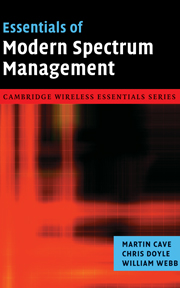Book contents
- Frontmatter
- Contents
- Acknowledgements
- I Emerging problems with the current spectrum management approach
- II Markets
- 4 Market solutions
- 5 Auctions
- 6 Spectrum trading: secondary markets
- 7 Technical issues with property rights
- 8 Economic issues with property rights
- 9 Competition issues relating to spectrum
- 10 Band management
- III Regulation
- IV Conclusions
- Further reading
- Abbreviations
- Author biographies
- Subject index
- References
10 - Band management
Published online by Cambridge University Press: 13 August 2009
- Frontmatter
- Contents
- Acknowledgements
- I Emerging problems with the current spectrum management approach
- II Markets
- 4 Market solutions
- 5 Auctions
- 6 Spectrum trading: secondary markets
- 7 Technical issues with property rights
- 8 Economic issues with property rights
- 9 Competition issues relating to spectrum
- 10 Band management
- III Regulation
- IV Conclusions
- Further reading
- Abbreviations
- Author biographies
- Subject index
- References
Summary
Introduction
The introduction of trading and liberalisation broadly allows market forces to shape the usage of spectrum through licence holders making decisions on their use and ownership according to their market assessment. However, there may be some cases where market forces do not act strongly because licence holders do not have sufficient knowledge of spectrum, only have a small holding, or where the ownership is very fragmented and hence the transaction costs are high.
One possible solution to these issues is the emergence of intermediaries known as band managers. These are organisations which would make a business of acquiring spectrum and then leasing it to end users. If they were able to do this more efficiently than the regulator then they might be able to operate profitably.
In this chapter we look at the different classes of band managers that might emerge, the key issues for their success, and build a simple business case to show the policy and economic conditions that would be necessary for their profitable operation. This is to allow a greater understanding of the likelihood of band managers emerging and the impact of on-going policy decisions.
The idea of deliberately creating band managers for particular frequencies has been the subject of debate at least since 1987, when it was proposed in the UK as a possible means of privatising spectrum assignment and market testing the provision of the service delivered [1]. There were two elements to the discussions that took place.
The possible superiority of private vs. public frequency assignment.
[…]
- Type
- Chapter
- Information
- Essentials of Modern Spectrum Management , pp. 151 - 164Publisher: Cambridge University PressPrint publication year: 2007

